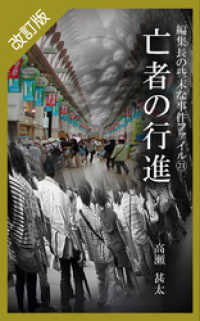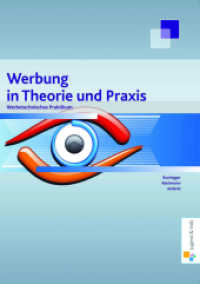- ホーム
- > 洋書
- > ドイツ書
- > Humanities, Arts & Music
- > History
- > middle ages
Description
Zahlreiche Quellen des 12. und 13. Jahrhunderts, die die italienischen Stadtkommunen beschreiben, dokumentieren eine besonders ausgeprägte Wertschätzung der Eloquenz. Angesichts jüngerer Forschungen zum Einfluss der Rhetorik auf das Selbstverständnis der Aristokratie im antiken Rom liegt ein analoger Blick auf Funktionen der Eloquenz in den Kommunen zwar nahe, steht aber noch aus. Dieser Band widmet sich erstmals dieser Forschungslücke, um politische ebenso wie religiöse Formen öffentlicher Rhetorik in ihren Entstehungsbedingungen und Funktionalisierungen zu untersuchen. Dabei werden öffentliche Rede und briefliche Rhetorik in den italienischen Kommunen sowohl im Rahmen der zeitgenössischen theoretischen Traktate als auch in ihrer praktischen Umsetzung analysiert. Diese im Einzelnen definierten Ausprägungen der Eloquenz in den Kommunen werden jeweils in besonderem Maß auf ihre spezifische sozialen Funktionen überprüft und mit vergleichbaren Formen der Rhetorik an der Kurie, am Staufischen Hof und in Byzanz kontrastiert.Numerose fonti, sia comunali che extracomunali, dei secoli XII e XIII sui comuni italiani dimostrano la particolare importanza dell'eloquenza. Dato che delle recenti ricerche storiche hanno dimostrato l'influenza della retorica sull'autocoscienza dell'aristocrazia nell'antica Roma, sembra utile svolgere lo sguardo anche sulle funzioni dell'eloquenza nella società comunale. Questo volume analizza le diverse forme del discorso pubblico, della retorica religiosa e dell'eloquenza scritta, indagando sia la teoria contemporanea della retorica. sia la performance pratica. I contributi del volume descrivono da diversi punti di vista le funzioni delle diverse forme dell'eloquenza nella società comunale, comparandole con le forme della retorica alla curia papale, nella cancelleria imperiale degli Staufer e, infine, nel mondo bizantino. Florian Hartmann studierte in Berlin und Bonn. Nach der Promotion 2005 und Tätigkeiten am Deutschen Historischen Institut in Rom, Italien, 2007-2010, und Bonn folgte 2012 die Habilitation. Danach lehrte er an den Universitäten Bonn, Chemnitz, Aachen und Erlangen. Er ist Professor für Mittlere Geschichte an der RWTH Aachen.
Prof. Dr. Uwe Baumann lehrt Anglistik: Literatur- und Kulturwissenschaft an der Universität Bonn.
Dr. Marc Laureys ist Professor für Mittel- und Neulateinische Philologie an der Universität Bonn und Sprecher des Bonner Centre for the Classical Tradition.
Dr. Winfried Schmitz ist Professor für Alte Geschichte am Institut für Geschichtswissenschaft der Universität Bonn.







